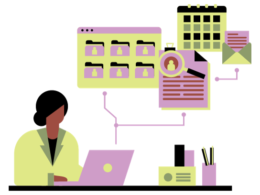As remote work continues to redefine the modern workplace, HR professionals find themselves navigating uncharted territory.
How has the shift to remote work influenced the way we approach Human Resources?
What challenges do remote work models present, and what opportunities lie in the realm of HR Analytics?
The era of remote work has brought about transformative changes, making it crucial for HR departments to adapt and innovate. How can HR Analytics rise to the occasion and help organizations thrive in this new landscape?
The Impact of Remote Work on HR Analytics: Challenges and Opportunities
In this comprehensive blog, we embark on a journey to explore the profound impact of remote work on HR Analytics. We’ll delve into the challenges that arise when the workforce is dispersed, and, equally important, the opportunities that this digital revolution presents.
Join us as we uncover the strategies, insights, and tools that HR professionals can leverage to make remote work a catalyst for success.
Let’s dive in!
The Changing Landscape of Work
Before we delve into the world of HR Analytics, let’s set the stage by acknowledging the seismic shift in the workplace. The traditional 9-to-5 office routine has given way to a flexible, location-agnostic model. Thanks to advancements in technology, employees can now collaborate, communicate, and contribute from the comfort of their homes or anywhere with an internet connection.
This shift, accelerated by global events, has far-reaching implications for organizations. It’s no longer about merely managing in-office staff; HR departments must now embrace a workforce scattered across various time zones and geographical boundaries.
How can HR practitioners ensure that remote work remains productive, engaging, and conducive to employee well-being?
This is where HR Analytics enters the scene.
The Role of HR Analytics in Remote Work
HR Analytics, often referred to as People Analytics, has always been instrumental in helping organizations make data-driven decisions about their workforce. In the context of remote work, its role becomes even more pivotal.
Here’s how HR Analytics can make a difference:
1. Performance Monitoring
With remote teams, tracking employee performance goes beyond traditional methods. HR Analytics can provide real-time insights into productivity, enabling organizations to recognize and reward high performers and offer support to those who may be struggling.
2. Employee Engagement
Maintaining a sense of connection and engagement in remote teams can be challenging. Analytics can gauge employee sentiment through surveys and feedback mechanisms, helping HR teams devise strategies to boost engagement.
3. and Mental Health
The remote work environment can impact employees’ mental health. Analytics can identify patterns and trends related to well-being, allowing organizations to implement wellness initiatives effectively.
4. Talent Acquisition
With remote work, talent pools are no longer confined to a specific location. HR Analytics can assist in identifying and recruiting the best talent, regardless of geographical constraints.
Challenges in Remote HR Analytics
While the opportunities presented by remote work are significant, they come hand in hand with challenges. Remote HR Analytics encounters obstacles such as data security, ensuring equitable evaluation, and addressing privacy concerns. Moreover, HR professionals must adapt to new tools and platforms for data collection and analysis.
Seizing the Opportunities
To harness the full potential of HR Analytics in the age of remote work, organizations should:
1. Invest in Technology
In today’s data-driven world, investing in advanced HR Analytics technology is paramount. Organizations must adopt sophisticated tools and software that enable seamless data collection and analysis in a remote work environment. These tools not only streamline HR processes but also provide real-time insights into employee performance, engagement, and well-being.
Moreover, technology plays a vital role in enhancing communication and collaboration within remote teams. Video conferencing, collaboration platforms, and data analytics software are just a few examples of technologies that can empower HR professionals to make informed decisions. By leveraging such tools, organizations can ensure that they are equipped to thrive in the digital age of remote work.
2. Prioritize Data Security
While embracing technology is crucial, organizations must also prioritize data security, especially when dealing with sensitive employee information. Remote work introduces new challenges in data protection, as data is transmitted and accessed from various locations and devices. To mitigate the risks associated with remote HR Analytics, robust security measures should be implemented.
This includes encryption of data both in transit and at rest, access controls, regular security audits, and employee training on data security best practices. Ensuring the confidentiality and integrity of employee data is not only a legal and ethical requirement but also essential for building trust within the remote workforce.
3. Empower HR Teams
Empowering HR teams is a fundamental aspect of harnessing the opportunities offered by HR Analytics in a remote work setting. HR professionals need to be equipped with the skills, knowledge, and training required to navigate the evolving landscape of remote work and data analytics.
Organizations should invest in training programs and resources that enable HR teams to effectively use HR Analytics tools and interpret data. This empowers HR professionals to identify trends, make data-driven decisions, and implement strategies that enhance remote employee engagement, performance, and well-being.
Moreover, HR teams should also be encouraged to stay updated on industry best practices and emerging trends in remote work and HR Analytics. By fostering a culture of continuous learning and adaptability, organizations can ensure that their HR professionals are well-prepared to lead in an increasingly remote and data-centric work environment.
If you’re passionate about HR, data-driven decision-making, and want to be at the forefront of this transformative journey, there’s no better time to take the next step.
Join Accredian’s Strategic HR Analytics program in partnership with IMI Delhi.
 Pin
PinEquip yourself with the knowledge, skills, and insights needed to navigate the complexities of remote work, harness the power of data, and drive your organization’s HR strategies to new heights.







may i know when your next batch for HRA is starting